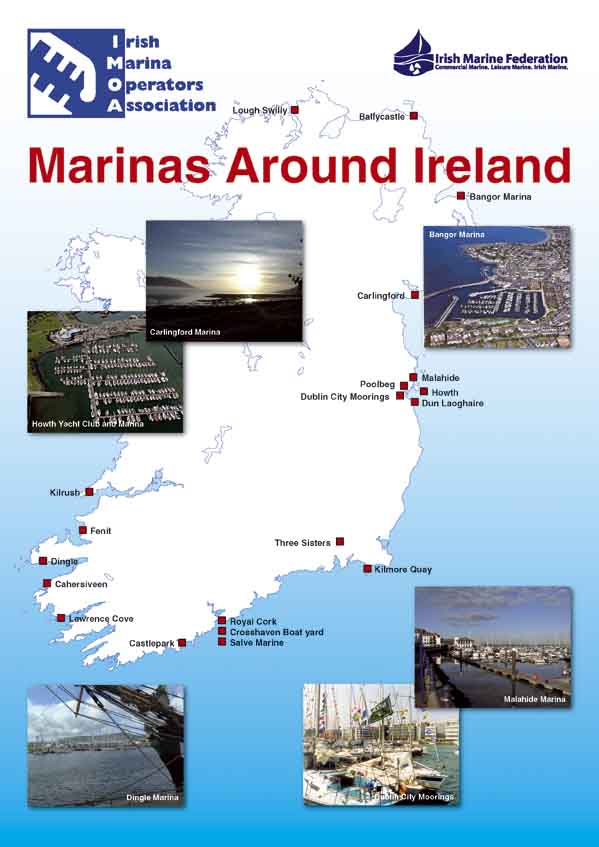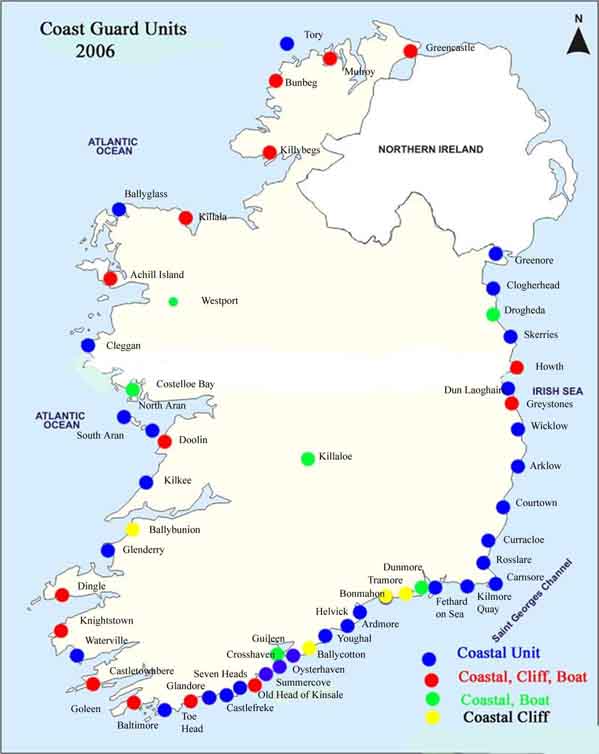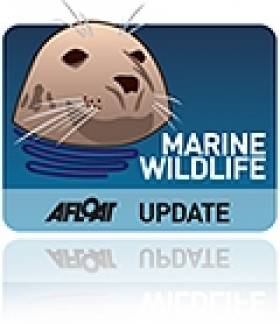Displaying items by tag: Marine
Irish Whale and Dolphin Group Online Conference Tomorrow
Irish Whale and Dolphin Group (IWDG) Sightings Co-ordinator Pádraig Whooley will be presenting at this weekend's TEDX event in the West Cork Hotel, Skibereen, Co. Cork tomorrow which will be streamed live on the internet and can be viewed here.
Irish Marina Operators Association
Irish Marina Operators Association (IMOA), c/o Irish Federation of Marine Industries, Confederation House, 84–86 Lower Baggot Street, Dublin 2. Tel: 01 605 1621, fax: 01 638 1621, email: [email protected]
The Irish Marina Operators Association was founded in May 2003 and represents 23 of the coastal marinas around our shores. The IMOA is a self managing special interest group within the Irish Marine Federation, the trade association affiliated to IBEC representing the marine industry in Ireland. The IMOA elects its own representative board of directors, the chairman automatically having a seat on the main IMF board.
The objectives of the IMOA are to provide a forum for discussion within the marina industry in Ireland and to represent the views of the marina operators to government in regard to legislation, regulation, training, insurance and health and safety issues.
The IMOA is an effective lobbying body and has achieved some success in relation to approved waste management plans for marinas and also with the new Development and Foreshore Act. The objectives of the IMOA are to ensure that Ireland’s marina industry develops in a sustainable way and will eventually provide for a necklace of marinas around our coastline.
In the future the IMOA will seek to have our marina infrastructure effectively marketed overseas as part of an integrated marine leisure tourism campaign.

Regional Contacts
Chairman – Mr Damien Offer, Malahide Marina. Tel: 01 845 4129, email: [email protected]
East – Mr Hal Bleakley, Dun Laoghaire Marina. Tel: 01 2020 040, email: [email protected]
South – Mr Wietza Buwalda, Salve Marina. Tel: 021 483 1145, email: [email protected]
South West – Mr Brian Farrell, Dingle Marina. Tel: 066 9151629, email: [email protected]
West – Mr John Hehir, Kilrush Creek Marina. Tel: 065 9052072, email: [email protected]
North West – Ms Nancy Doherty, Lough Swilly Marina. Tel: 074 9360008, email: [email protected]
North – Mr Andrew Jaggers, Bangor Marina. Tel: 028 91453297, email: [email protected]
Irish Marine Federation
The Irish Marine Federation (IMF) is the national organisation representing both commercial and leisure sectors of the marine industry in Ireland.
The IMF is affiliated to the Irish Business and Employers Confederation (IBEC) which provides the Secretariat from its Dublin office.
IBEC has regional offices in Cork, Donegal, Galway, Limerick and Waterford and an office in Brussels, the Irish Business Bureau.
The primary aims of the Federation are:
To promote the interests of all sectors of the marine industry in Ireland and to encourage its growth and development.
To represent the interests of the industry to Government, State Agencies and European institutions, thereby influencing public policies.
To promote the image of the industry through quality awareness, public statements and the organisation of Boat Shows.
To provide advice, information and services to members in order to assist in achieving these objectives.
Membership of the Federation also gives full membership of the Small Firms Association (www.sfa.ie) who represent small firms trans-sectorally by coverage in the national press, television and radio and through the many regional meetings and seminars which take place throughout the country.
The association conducts regular surveys of business trends and publishes a bi-monthly magazine Running Your Business along with many reports on the needs of Irish business. They also provide advice and assistance on all aspects of personnel and industrial relations and specially designed training programmes aimed at small firms.
Membership of the IMF is open to all firms operating in the marine industry in Ireland, subject to the approval of the Council of the Federation.
Irish Marine Federation (IMF), Confederation House, 84/86 Lower Baggot Street, Dublin 2.
Tel: 01 605 1652, Fax: 01 638 1652, Email: [email protected]
National Organisations
National Organisations
There are a number of different organisations established in Ireland to manage the marine leisure sector and these stakeholders are an important part in the future growth of the sector that is arguably worth 700 million euro per annum to the Exchequer.
The main organisations – including some in the UK – are:
Cruising Association of Ireland – The Cruising Association of Ireland was set up with the aim of working with the Irish Sailing Association and the Royal Yachting Association Northern Ireland for the promotion and encouragement of cruising and of social union among its members.
Heritage Boat Association – The Heritage Boat Association’s aspiration is to protect, promote and celebrate the floating heritage on the inland waterways of Ireland.
Inland Waterways Association – A voluntary body formed in 1954 of inland waterways enthusiasts, the IWA advocates the use, maintenance, protection, restoration and improvement of the inland waterways of Ireland.
Irish Amateur Rowing Union/Rowing Ireland – The IARU/Rowing Ireland is the governing body for rowing in Ireland and represents over 100 clubs across Ireland. Rowing is one of Ireland's most successful sports, having won multiple World Championships over the last decade.
Irish Coast Guard (IRCG) (Garda Cósta na hÉireann) – The Irish Coast Guard is part of the Department of Transport. The Irish Search and Rescue Region, which includes most of the Republic of Ireland and parts of Northern Ireland, is the area over which the coast guard has authority. This area is bounded by the UK Search and Rescue Region.
Irish Cruiser Racer Association – ICRA can be contacted via Commodore Fintan Cairns at [email protected] or the Secretary Denis Kiely at [email protected]
Irish Disabled Sailing Association/Sailforce – Sailforce is a new campaign established by the Irish Disabled Sailing Association (IDSA) to highlight the achievements and activities of their current membership and to introduce members of the general public to the concept of sailing as a viable sport for the disabled.
Irish Marina Operators Association – The IMOA is an associate group of the Irish Marine Federation (IMF) focussing exclusively on the needs of marina operators. Membership of IMOA currently represents coastal marinas, but will eventually be open to Ireland's inland waterway marinas.
Irish Marine Federation – The IMF is the national organisation representing both commercial and leisure sectors of the marine industry in Ireland.
Irish Maritime Law Association – The Irish Maritime Law Association was formed at a meeting in the Shelbourne Hotel in Dublin on 23 May 1963.
Irish Rowing Union – The IARU is the governing body for rowing in Ireland and represents over 100 Clubs across Ireland. Rowing is one of Ireland’s most successful sports, having won multiple World Championships over the last decade.
Irish Sailing Association – The ISA is the national governing body for all forms of recreational and competitive activities involving sail and engine powered craft in Ireland.
Irish Sea Shipping – Online Shipping Magazine with shipping news and views from the Irish and Celtic Seas since 1995.
Irish Ships & Shipping – Irish Shipping Ltd. was set up in 1941 to ensure Ireland could import and export essential goods during World War II. Britain had decided that it could no longer put its ships and men at risk by supplying a country had had decided to remain neutral. So after a meeting held at Earlsfort Terrace, Dublin, on the 21st of March 1941, a National Shipping Company was formed called 'Irish Shipping Ltd.' .
Irish Underwater Council – The Irish Underwater Council is the national governing body for recreational underwater sports in Ireland. It was founded in 1963 to organise and promote sport scuba diving and snorkeling. At that time there were only six clubs but the sport has expanded over the years and today encompasses 84 clubs distributed all over Ireland.
Irish Water Safety – Irish Water Safety is the statutory body established to promote water safety in Ireland. Their role is to educate people in water safety best practices and develop public awareness campaigns to promote necessary attitudes, rescue skills and behaviour to prevent drownings and water-related accidents.
Marine Casualty Investigation Board – The function of the MCIB is to carry out investigations into marine casualties that take place in Irish waters or involve Irish registered vessels. The main purpose of the Board's investigations is to establish the cause or causes of a marine casualty with a view to making recommendations to the Minister for Transport for the avoidance of similar marine casualties. It shall not be the purpose of an investigation to attribute blame or fault.
Met Éireann: Irish Meteorological Service – Met Éireann, the Irish National Meteorological Service, is part of the Department of the Environment, Heritage and Local Government. It is the leading provider of weather information and related services for Ireland.
North West Charter Skippers Association – The North West Charter Skippers Organisation was inaugurated in January 2002, and was formed to enhance and develop Charter Boat Services through the interchange of Information through the promotion of a fleet of fully licensed, insured, and well-equipped Modern Sea Angling Vessels adopting best practice and providing a high quality service in Sea Angling and general tourism charters to the Northwest Coast of Ireland – 'Service with Safety'
Professional Association of Diving Instructors – PADI is the world’s leading scuba diving training organisation. With more than forty years experience and 5,300 dive shops and resorts worldwide, PADI training materials and services let you experience scuba diving from nearly anywhere.
RNLI Ireland – The RNLI is a registered charity that saves lives at sea. It provides a 24-hour lifeboat search and rescue service 100 nautical miles out from the coast of Ireland and the UK. The RNLI relies on voluntary contributions and legacies for its income.
Royal Yachting Association – The RYA is the national body in the UK for all forms of boating, including dinghy and yacht racing, motor and sail cruising, ribs and sports boats, powerboat racing, windsurfing, inland cruising and narrowboats, and personal watercraft.
Royal Yachting Association Northern Ireland – The RYA is the national body in the UK for all forms of boating, including dinghy and yacht racing, motor and sail cruising, RIBs and sportsboats, powerboat racing, windsurfing, inland cruising and narrowboats, and personal watercraft. The RYANI are their Northern Irish branch.
Union Internationale Motonautique/International Powerboat Racing Club – The UIM is the international governing body of power boating and is recognized as such by the International Olympic Committee. It is also a member of the General Association of International Sports Federations, and the Association of the IOC Recognized International Sports Federations. The sport governs all power boating disciplines including aqua bike, circuit, offshore, pleasure navigation and radio-controlled.
Waterways Ireland – one of the six North/South Implementation Bodies established under the British Irish Agreement in 1999, Waterways Ireland has responsibility for the management, maintenance, development and restoration of inland navigable waterways principally for recreational purposes. The waterways under the remit of the body are the Barrow Navigation, the Erne System, the Grand Canal, the Lower Bann, the Royal, the Shannon-Erne Waterway and the Shannon Navigation.
The Irish Coast Guard (IRCG) (Garda Cósta na hÉireann) is part of the Department of Transport.
All the latest Irish Coast Guard news is here.
The Irish Search and Rescue Region, which includes most of the Republic of Ireland and parts of Northern Ireland, is the area over which the coast guard has authority. This area is bounded by the UK Search and Rescue Region.
The Coast Guard is responsible for:
– Search and Rescue
– Marine communications network
– Marine safety awareness
– Mountain and Cave Rescue
Pollution and Salvage response in the marine environment (the Marine Rescue Co-ordination Centre [MRCC] in Dublin coordinates all pollution and salvage control in the Irish Exclusive Economic Zone [EEZ]).

Note that not all Irish Coast Guards have enforcement powers – only some officers under warrant.
The Coast Guard (Garda Cósta) does not form part of the Irish Defence Forces, rather it operates as an agency of the Department of Transport under the Maritime Safety Directorate. The Maritime Safety Directorate comprises two main sections, the Maritime Safety and Marine Environment Division (MSED) and the Marine Survey Office (MSO). The Marine Survey Office also includes the Marine Radio Affairs Unit (MRAU). The Mercantile Marine Office (MMO) also works under the Directorate.
- The Maritime Safety and Marine Environment Division is responsible for maritime safety, security policy and legislation (including leisure safety), aids to navigation and corporate governance of the Commissioners of Irish Lights and marine environment protection issues.
- The Marine Survey Office deals with the inspection, survey, certification and licensing of vessels and vessels radio equipment; the examination and certification of seafarers competencies; enforcement of standards by way of audits on organisation and facilities and prosecutions for breaches of regulations.
While in some jurisdictions they are the responsibility of the Coast Guard, in Ireland, fisheries patrols are carried out by the Navy and drug smuggling patrols by Customs, the Gardaí and the Navy. However, all the above government services can at any time request assistance from each other when needed.
(The above information and image courtesy of Irish Coast Guard)
Irish Coast Guard, MRCC Dublin, Coast Guard Headquarters, Department of Transport, Leeson Lane, Dublin 2. Tel: 01 678 2303, Fax: 01 678 3459
























































